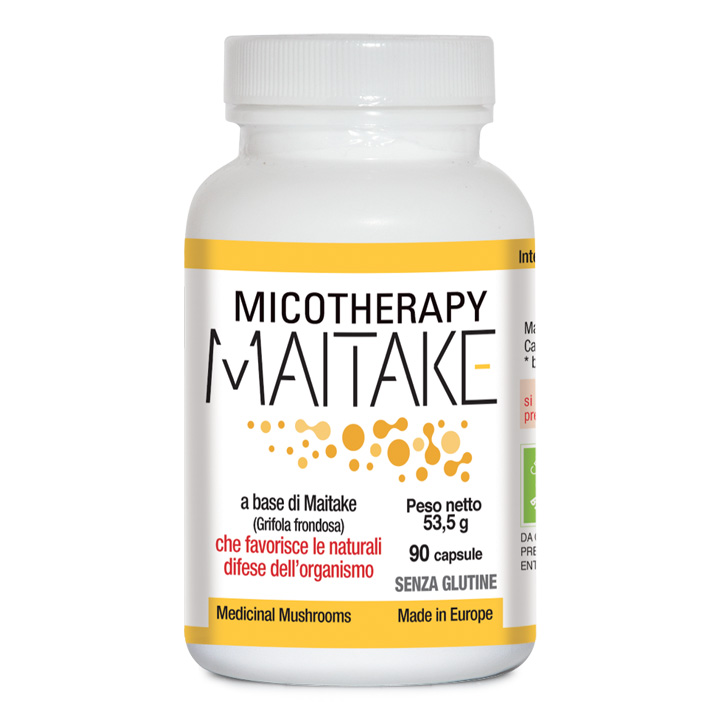
Metabolic rebalancing support
Food supplement containing organically grown Maitake (Grifola frondosa) (IT BIO 006) – Made in Europe.
Health benefits:
Also known as “King of mushrooms”, Maitake is considered an adaptogenic tonic, with the ability to rebalance the body’s functions, increase vitality and enhance the immune response. Thanks to the presence of polysaccharides and fat-soluble secondary metabolites, Maitake is useful in the treatment of metabolic problems, hyperglycemia and hyperlipidemia.
Properties:
Of the various isolated polysaccharide fractions, fraction D and fraction X were evaluated for their effectiveness: the first was found to be effective on the immune system, the second at the metabolic level also throught modulating gut-microbiota composition. More recent studies and observations have shown that the whole mushroom is more effective than the extract at the metabolic level and can be useful in controlling weight gain and rebalancing the lipid profile, while at the same time supporting liver function.
Ingredients:
- Organically grown Maitake (Grifola frondosa) sporophorum (IT BIO 006)
- Vegetable cellulose capsules
Contained substances:
- β-D-glucans (β 1,3 – β 1,6) both soluble and insoluble
- Minerals: potassium, iron and magnesium
- Amino acids
- Vitamin B1, B2 and B3
- Ergosterol, precursor of vitamin D2 and D4
- Lectins and metalloproteins
- Ergothioneine
- Triterpenes
- Ergosterols
- Polyphenols
Directions:
3 capsules per day, preferably away from meals.
Pack:
pack containing 90 capsules
vegetable cellulose capsules
Notes:
Gluten free
ICEA Organic certified product
No GMO
Made in Europe
| AVERAGE CONTENT OF CHARACTERISING INGREDIENTS | PER DAILY DOSE (4 CAPSULES) |
| Maitake sporophorum | 1500 mg |
BIBLIOGRAPHY:
- Jones K. Maitake, A potent medicinal food. Altern Complement Ther 1998; 4:420-9.
- Namba H, Hamaguki A, Kuroda H. The chemical structure of an antitumor polysaccharide in fruit bodies of Grifola frondosa (Maitake) Chem.Pharm.Bull. Vol.34(3):1162-1168, 1987
- Namba H Antitumor activity of o rally administrated “D-fraction” from Maitake nushroom (Grifola frondosa). J.Naturopathic Med Vol.4(1):10-15; 1993
- Namba H. N. Maitake D-fraction and preventive potential for cancer. Journal of Orthomolecular Medicine Vol.12(1):43-49, 1997
- Kodama N, Asakawa A, Inui A. Enhancement of cytotoxicity of NK cells by D-Fraction, a polysaccharide from Grifola frondosa. Oncol Rep. 2005 Mar;13(3):497-502
- Harada N, Kodama N, Nanba H., Cancer Lett Relationship between dendritic cells and the D-fraction-induced Th-1 dominant response in BALB/c tumor-bearing mice. 2003 Mar 31;192(2):181-7
- Kreis W. Current chemotherapy and future directions in research for the treatment of advanced hormone-refractory prostrate cancer. Cancer Invest 1995; 13:296-312
- Finkelstein MP, Aynehchi S, Samadi AA, Drinis S, Choudhury MS, Tazaki H, Konno S. Chemosensitization of Carmustine with Maitake _-Glucan on Androgen- Independent Prostatic Cancer Cells: Involvement of Glyoxalase I. The Journal of Alternative and Complementary Medicine. 2002, 8(5): 573-580.
- Yang D, Li S, Wang H. Prevention of postoperative recurrence of bladder cancer: a clinical study. Zhonghua Wai Ke Za Zhi. 1999 Aug;37(8):464-5)
- Yang DA, Li SQ, Li XT. Prophylactic effects of zhuling [Maitake] and BCG on postoperative recurrence of bladder cancer., General Hospital of Jinan Unit of People’s Liberation Army
- Fullerton SA et al. Induction of apoptosis in human prostatic cancer cells with [beta]-glucan (maitake mushroom polysaccharide). Mol Urol 2000; 4:7-11
- Kodama N, Komuta, Nanba H. Can Maitake MD-Fraction aid cancer patients? Alternative Medicine Review_Vol.7(3):236-239,2002
- Finkelstein MP, Aynehchi S, Samadi AA, Drinis S, Choudhury MS, Tazaki H, Konno S. Chemosensitization of carmustine with maitake beta-glucan on androgenindependent prostatic cancer cells: involvement of glyoxalase J Altern Complement Med. 2002 Oct;8(5):573-80. I.
- Fukushima M, Ohashi T, Fujiwara Y, Sonoyama K, Nakano M. Cholesterol-Lowering Effects of Maitake (Grifola frondosa) Fiber, Shiitake (Lentinus edodes) Fiber, and Enokitake (Flammulina velutipes) Fiber in Rats. Experimental Biology and Medicine 226:758-765 (2001)
- Nishina A, Kimura H, Sekiguchi A, Fukumoto R, Nakajima S, Furukawa S. Lysophosphatidylethanolamine in Grifola frondosa as a neurotrophic activator via activation of MAPK J. Lipid Res. 2006. 47: 1434–1443.
- Manohar V, Talpur NA, Echard BW, Lieberman S, Preuss HG. Effects of a water-soluble extract of maitake mushroom on circulating glucose/insulin concentration in KK mice. Diabetes, Obesity and Metabolism, 4, 2002 (43-48)
- Horio H, Ohtsuru M. Maitake (Grifola frondosa) improve glucose tolerance of experimental diabetic rats. J.Nutr.Sci.Vitaminol. 2001; 47: 57-63
- Kubo K, Namba H. Anti-diabetic mechanism of Maitake (Grifola frondosa). In: Royse DJ, ed. Mushroom Biology and Mushroom Products. University Park, PA: Penn State University; 1996:215-221.
- Kubo K, Aoki H, Namba H. Anti-diabetic activity present in the fruit body of Grifola frondosa (Maitake). Biol.Pharm.Bull. 1994; 17(8): 1106-1110.
- Kabir Y, Yamaguchi M, Kimura S. Effect of shiitake (Lentinus edodes) and maitake (Grifola frondosa) mushrooms on blood pressure and plasma lipids of spontaneously hypertensive rats. J Nutr Sci Vitaminol 1987;33:341-346.
- Kabir Y, Kimura S. Dietary mushrooms reduce blood pressure in spontaneously hypertensive rats (SHR). J Nutr Sci Vitaminol 1989;35:91-94.
- Kabir Y, Hoshino T, Komai M, Kimura S. Histopathological changes in spontaneously hypertensive rats after feeding shiitake (Lentinus edodes) and maitake (Grifola frondosa) mushroom diets. J Clin Biochem Nutr 1989;6:187-193.
- Adachi K, Nanba H, Otsuka M, Kuroda H. Blood pressure-lowering activity present in the fruit body of Grifola frondosa (maitake):I. Chem Pharm Bull 1988;36:1000-1006.
- Wu S, Zou D, Han SH, et al. Therapeutic effect of Grifola polysaccharides in chronic hepatitis B [abstract P-18]. In: International Symposium on Production and Products of Lentinus Mushroom, Programme and Abstract, Qingyuan, Zhejiang Province, China: International Society for Mushroom Science, Committee on Science, Asian Region, Qingyuan County Government, Zhejiang Province, China, 1994.
- Kubo K, Nanba H. The effect of maitake mushrooms on liver and serum lipids. Altern Ther Health Med 1996;2:62-66.
- Kubo K, Nanba H. Anti-hyperliposis effect of maitake fruit body (Grifola frondosa).I. Biol Pharm Bull 1997;20:781-785.
- Okamura M. Distribution of ascorbic acid analogs and associated glycosides in mushrooms. J Nutr Sci Vitaminol 1994;40:81-94.
- Ohtsuru M. Anti-obesity activity exhibited by orally administered powder of maitake mushroom (Grifola frondosa). Anshin July1992;198-200. [Article in Japanese]
- Yokota M. Observatory trial of anti-obesity activity of maitake mushroom (Grifola frondosa). Anshin July1992;202-203. [Article in Japanese]
- Miura N, Ohno N, Aketagawa J, et al. Blood clearance of (1—>3)-beta-D-glucan in MRL 1pr/1pr mice. FEMS Immunol Med Microbiol 1996;13:51-57.
- Hobbs C. Grifola frondosa monograph. Santa Cruz, CA: Botanica Press; 1995:110-115.



